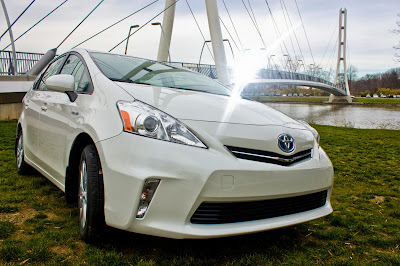There's been a lot of talk in the past year about the future of automobiles and how we all need to prepare ourselves for the day of the "
driver-less" car. Automakers and even tech giants like Google are working on their own versions of cars that pilot themselves, and claim that they could be ready in the next 10 years. Hop in, tell it where you want to go, and watch in amazement as the vehicle drives you to your destination. Sounds like science fiction, right? Would you trust a computer system to make all of your driving decisions?
Toyota's chairman Takeshi Uchiyamada, who was one of the pioneers of the original
Toyota Prius, has a different opinion– he believes that we should maximize advances in hybrid technology first. Before autonomous cars (or even simply all-electric cars) take over, Uchiyamada says "there are still many more gains we can achieve with hybrids." For example, the current 3rd generation of the Prius has 10% better fuel efficiency than the previous one, at a combined MPG of 50. Mr. Uchiyamada is confident they can improve that number even more when the 4th generation is developed.
His game plan? To sell 5 million hybrid vehicles in the U.S. by the end of 2016 and achieve mileage standards set forth by the Obama administration. “It’s only when we put ourselves under the same kind of intense
pressure we faced in developing the Prius that we can achieve great
goals. That’s what it takes. I want our industry to achieve this goal," he said.
Toyota's continued work with hybrid technology is actually more in line with what I think is best for all of us, as drivers. Rather than moving on from hybrids and only focusing on self-driving vehicles, they're slowly adding more self-driving features in future vehicles and getting us comfortable with using them. Two examples immediately come to mind: the first is the advanced technology package available on the
Prius V, which offers a
parking assist option where the driver uses a camera to find a suitable spot for the vehicle. Once located, the vehicle automatically guides itself into a parking spot.
The second is the
Yaris Hybrid-R, a concept vehicle capable of 414 horsepower. It utilizes multiple motors, with a gas engine to power the two front wheels, and two electric motors that specifically power the rear wheels, giving the car all-wheel drive traction. While unlikely to ever hit the showroom, elements of its design may make their way into future cars.
In addition to both of these technologies, Toyota is also working on sensors that would allow a vehicle to apply brakes and control the steering wheel on its own. According to Mr. Uchiyamada, they want to eliminate driving fatalities on the highway, but believes that drivers need to be in control of their vehicle for the foreseeable future.
Do you agree that we're not yet ready for a world where cars drive themselves?








